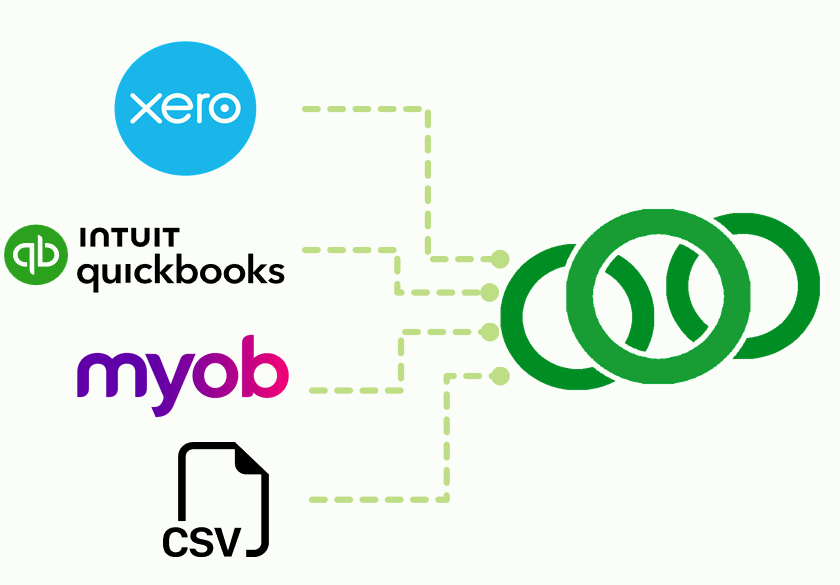For many finance teams, exporting data manually from accounting systems like Xero, QuickBooks, or MYOB is a regular part of the monthly reporting process. This approach might seem straightforward, but it introduces a range of challenges that can slow down your financial close, increase the risk of errors, and limit the insights you can draw from your data. In this blog, we’ll explore the disadvantages of manual data exports and how BrizoSystem offers a better, more efficient way to consolidate and analyze financial data.
1. Time-Consuming and Labor-Intensive
Exporting financial data manually is a repetitive, time-consuming task. Each month, finance teams must log in to multiple systems, download data in various formats (CSV, Excel, PDF), and then spend hours reformatting and merging this data into a consolidated report.
For example, if your group has 10 subsidiaries, this process can easily take days, reducing the time available for strategic financial analysis and planning.
How BrizoSystem Solves This:
BrizoSystem automatically pulls data from your accounting software, including Xero, QuickBooks, and MYOB, eliminating the need for manual exports. This saves time and allows your team to focus on more value-added activities, like financial analysis and business strategy.
2. High Risk of Errors and Inconsistencies
Manual exports are prone to human error. Simple mistakes like copying the wrong data, applying incorrect formulas, or missing a file during consolidation can lead to significant reporting errors. This can result in inaccurate financial statements and potentially costly missteps in decision-making.
Example:
Imagine you accidentally omit a subsidiary’s financials or misapply an exchange rate. This small error can lead to a distorted view of your group’s financial health, potentially misleading your board or investors.
How BrizoSystem Solves This:
BrizoSystem eliminates this risk by automating data imports and applying consistent, system-driven calculations. This reduces the chance of human error and ensures accurate, reliable financial reports every time.
3. Inconsistent Data Formats
Accounting systems often use different data structures, account codes, and reporting formats, making it challenging to consolidate data manually. This can lead to inconsistent financial statements and wasted time spent reformatting data.
How BrizoSystem Solves This:
With BrizoSystem’s Common Chart of Accounts (CCOA), you can standardize account mappings across all your subsidiaries, ensuring consistent data formats and reducing the manual effort required to align financials.
4. Data Security and Compliance Risks
Exporting financial data manually increases the risk of data breaches and non-compliance. Files can be misplaced, accidentally shared, or accessed by unauthorized users, putting sensitive financial information at risk.
How BrizoSystem Solves This:
BrizoSystem provides a secure, central platform for financial data, reducing the need for file exports and improving data security. It also offers audit trails and user permissions, ensuring only authorized users have access to sensitive information.
5. Limited Real-Time Insights
Manually exported data is typically static, reflecting only a snapshot of your financial position at a specific point in time. This limits your ability to monitor real-time performance or respond quickly to changing business conditions.
How BrizoSystem Solves This:
BrizoSystem provides real-time financial insights, allowing you to make faster, data-driven decisions. It supports features like live dashboards, drill-down reports, and KPI tracking, giving you a complete, up-to-date view of your group’s financial performance.
6. Difficulties in Scalability
As your business grows and adds more subsidiaries, manually exporting data becomes increasingly impractical. The more entities you manage, the more complex and error-prone the manual consolidation process becomes.
How BrizoSystem Solves This:
BrizoSystem is designed to scale with your business, offering flexible consolidation structures and support for multi-entity financial reporting. Its Virtual Group feature even allows you to create custom reporting structures based on geography, product lines, or business functions.
Conclusion: Streamline Your Financial Reporting with BrizoSystem
Manually exporting data for financial reporting is not just inefficient—it’s a risky approach that can lead to costly errors, data security issues, and missed opportunities for real-time insights. With BrizoSystem, you can automate data collection, improve data accuracy, and streamline your financial reporting processes, freeing your finance team to focus on strategic decision-making.
✅ Ready to Say Goodbye to Manual Data Exports?
✅ Watch a Demo
✅ Start Your Free Trial Today

